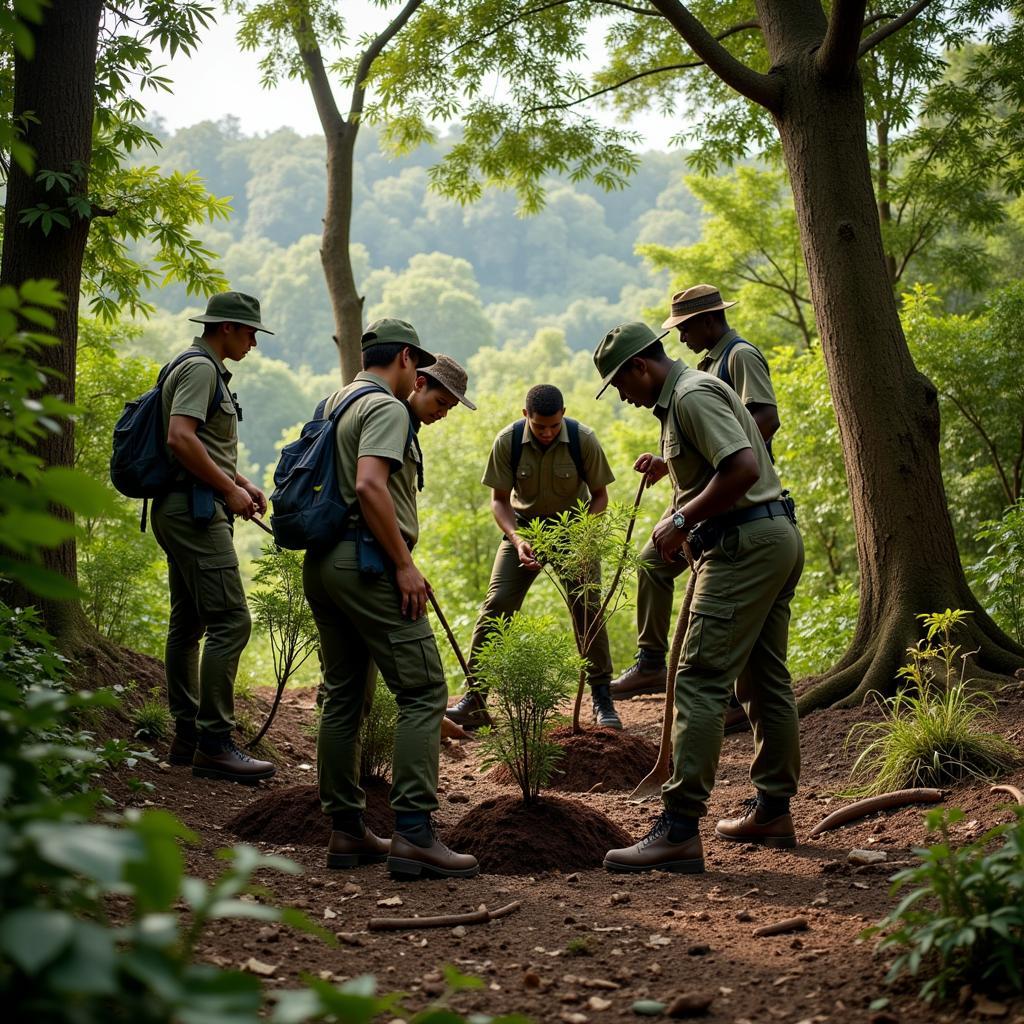The Allure and Reality of the African Jungle Man and Woman
The phrase “African Jungle Man Woman” often evokes romanticized images of individuals living in harmony with nature, untouched by modern civilization. While this notion holds a certain allure, it’s crucial to approach this topic with sensitivity and a commitment to portraying the diverse realities of life in Africa.
Deconstructing Stereotypes: Beyond the Primitive Lens
The term “jungle” itself carries a heavy weight of historical baggage, often used to depict Africa as a monolithic and untamed wilderness. This simplification disregards the continent’s incredible diversity of ecosystems, cultures, and lifestyles. Similarly, using “man” and “woman” in such a generalized manner risks perpetuating harmful stereotypes about African people.
It is essential to remember that Africa is not a monolith. Within its vast landscapes, you will find bustling cities, serene savannas, arid deserts, and yes, dense rainforests. Each of these environments fosters unique ways of life, traditions, and relationships with the natural world.
Diverse Cultures, Diverse Lifestyles: A Glimpse into Authentic Experiences
Instead of seeking a singular “African jungle man woman,” let’s delve into the specific communities who call these environments home. For instance, the Baka people of the Congo Basin, known for their deep understanding of the rainforest’s intricate ecosystem, have thrived for centuries as hunter-gatherers.
Similarly, the Himba people of Namibia, with their distinctive ochre-covered hair and traditional attire, demonstrate a remarkable adaptation to the harsh desert environment. Their lives are intertwined with the rhythms of nature, from their nomadic pastoralism to their intricate knowledge of medicinal plants.
It’s crucial to approach these cultures with respect, understanding that their ways of life are not relics of the past but rather vibrant and evolving expressions of human adaptation and resilience.
The Impact of Modernity: Navigating a Changing World
Today, many communities across Africa, including those residing near or within jungle environments, are navigating the complexities of globalization and modernization. Access to education, healthcare, and technology is gradually transforming traditional ways of life.
However, these changes also present challenges. Deforestation, climate change, and cultural erosion threaten the delicate balance that many communities have maintained with their environment for generations.
Moving Forward: Embracing Respect and Understanding
Instead of perpetuating reductive narratives, let’s engage with the stories of individuals and communities who embody the true diversity and richness of Africa. By learning about their challenges, triumphs, and perspectives, we can foster a deeper appreciation for the complex realities of life on this vibrant continent.
Remember, seeking out stories that go beyond the superficial is essential. Explore resources like easy African drawings to gain a visual understanding of cultural expression or delve into the narratives depicted in an African jungle adventure movie to spark further exploration. However, always approach these sources with a critical eye, recognizing the potential for bias and the importance of seeking out diverse perspectives.
Let’s move beyond simplistic labels and engage with Africa and its people with the respect, curiosity, and open-mindedness they deserve.
FAQs
1. What are some common misconceptions about African jungle life?
Many misconceptions stem from viewing Africa as a homogeneous entity and its people as living static, unchanging lives. The reality is far more diverse, with each community possessing unique traditions, beliefs, and adaptations to their specific environments.
2. How is modernity impacting traditional ways of life in Africa?
Modernization brings both opportunities and challenges. While access to education and technology can be empowering, issues like deforestation and cultural erosion pose significant threats to the sustainability of traditional lifestyles.
3. How can I learn more about specific African cultures and communities?
Engage with reputable documentaries, books, and articles written by African scholars and storytellers. Look for resources that prioritize authenticity, diverse perspectives, and respect for the communities they portray.
4. Why is it important to challenge stereotypes about Africa?
Stereotypes perpetuate harmful misconceptions and hinder genuine understanding. By challenging these narratives, we create space for more nuanced and accurate representations of Africa and its people.
Need More Information?
Have more questions about African culture and life? Contact us!
Phone: +255768904061
Email: kaka.mag@gmail.com
Address: Mbarali DC Mawindi, Kangaga, Tanzania
Our dedicated team is available 24/7 to assist you.
